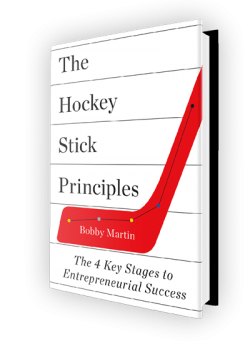Last week, I shared with MBA students at Georgetown University my research on how founders discovered hockey stick revenue growth. A few of these entrepreneurs focused on one market, working on their entire business model, finding early adopter customers, and building a remarkable brand. One student asked a challenging question: “What about founders who did all those things and still weren’t successful? Did their actions make the biggest difference, or was most of their success a result of luck or circumstance?”
His question really got me thinking. I know founders who showed great skill and patience but who still weren’t successful. In 2006, my friend Tim Horan started Becooz, a website application neighbors use to share profiles, information about service providers, and neighborhood happenings. Becooz is like Facebook-meets-Citysearch—useful for tight circles of neighbors and friends. Local media companies are the primary paying customers because they benefit most from Becooz’s access to targeted advertising.
Taking a leap
In January 2006, Tim quit his job to pursue Becooz full-time. Since he had no programming skills, Tim knew that his greatest challenge in getting Becooz off the ground would be getting the product built. He considered two options: He could find an experienced software engineer partner who’d invest sweat equity, or he could solicit investment capital to pay a firm to complete the project.
During 2006, Tim pitched his idea to potential partners who could program the system, but he struggled in getting anyone on board. “I told them I thought it could be big and disruptive,” Tim recalls, “but I had a really hard time trying to get somebody who wanted to get involved at an early-stage level.”
Still working full-time on his idea during 2007, Tim was inching toward getting a finished product. He invested $50,000 of his own money, then won a $50,000 grant. He used the money to build a beta-version of the product, but the interface was still nowhere near ready to market.
Late in 2007, Tim was in advanced conversations with two angel capital firms to raise $450,000 to hire two talented programmers who were ready to join him. Unfortunately, a partner at one of the angel firms prevented the deal from happening. The second strategy was to raise capital from local media companies who would be future customers. Tim was in intermediate conversations about their investing, but then in late 2008, the economy took a dive and any hope of attracting investment vanished.
After committing three years of work to the venture, Tim decided to put Becooz on hold and pursue a stable job. Tim was frustrated that he couldn’t quite get his big idea up and running, but today he bears no grudges.
What does it take?
Back to Georgetown… The MBA students were adamant that the roles of luck and circumstance were most crucial to success. They had a point. For example, Tim is an experienced marketer who’s successfully led sales and marketing organizations. I doubt Tim’s lack of skill or persistence were Becooz’s biggest problems. I believe unfortunate circumstances and bad luck–namely the economy and poor timing–played critical roles.
But I didn’t totally agree with the MBAs that luck and circumstance are most critical to success. I ascertained that skill and persistence play bigger roles—naming founders such as Jack Dorsey, co-founder of Twitter, Square, and other ventures, and Wayne Huizenga, co-founder of Waste Management, Blockbuster Video, and AutoNation, who have been successful at building different types of businesses at different times. “Their success is clearly a result of skill!” I exclaimed. But after thinking more about it—maybe we were all correct. Luck, circumstance, skill, and persistence all play important parts. Each could have the most important role, or all of them, or two of them, or three—depending upon the day. But one thing is for sure: You can control skill and persistence. And having both greatly improves your chances of success.
Tim offers the best advice: “The game never ends. We took a shot. But you know what? There’s going to be, I hope, four or five more opportunities in front of us.”
Sign up to get more great insights directly to your inbox.
As a special bonus, you'll also immediately get access to my inside analysis of what made 172 diverse companies achieve take-off revenue growth.


Bobby- you’ve heard the two most common cliches about luck, right? 1. The harder I work, the luckier I get and 2. Luck is when preparation meets opportunity. I would guesstimate the mix at 85% hard work and 15% luck and/or timing.